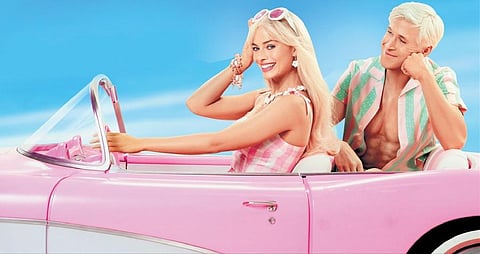

Mattel’s iconic Barbie may be popularly known to be a simple doll invented for a child’s play, but it eventually spiraled to be the epitome of the myth of Pygmalion, while dangling on the borderline of ambivalence. Barbie was not just another piece of plastic that held a prominent place in a child’s toy cabinet. It subconsciously tickled and triggered the femme energy to aspire for more. It was a companion, yes, but it also unfairly gave ungainly labels. With such a conundrum, Greta Gerwig’s Barbie not only jumps onto the live–action adaptation bandwagon, but uses the prism of genre to give us a subverted gaze at our society and its absurdity Et al.
In the centre of the Barbieland universe, which unapologetically radiates pink power and is the utopia of feminine energy (don’t confuse it with feminism, because Kens are just Kens and nothing without Barbies), is Margot Robbie’s high-heeled ‘Stereotypical’ Barbie. She is the OG Barbie with the candy floss personality and all the ‘desired’ proportions. Despite the presence of a President Barbie, Pulitzer Prize-winning Barbie, Nobel winner Barbie, and a doctor Barbie, the film revolves around THE Barbie. There is a hilarious fourth-wall breaking on Margot’s pitch-perfect casting that reveals the self-awareness of Greta, Margot, and Co. They could have also taken a hit at being white women at the helm of making this fiercely feminist film. But that’s an issue for another day, I guess.
Coming back to Barbieland, it is a perfect day every day. So much so that the ladies are always at ease, privileged enough to dress up and play chess by the pool under broad daylight or even throw a disco party whenever they want. Is it Greta’s sublime dig at Mattel for its role in reversing the psyche of girls under the guise of beautified environment, or pointing out the idea that Barbie can do anything, I mean... ANYTHING, a Utopian concept for women in the real world.
This plastic box-perfect world of Barbie takes a turn that entwines the doll’s fate to her suddenly appearing ‘flat feet’. Her cheery thoughts gets transformed into dark, weird and crazy enough to be... human. Soon enough, the narrative puts Barbie in the real world, and she is made to realise how the Barbies didn’t really solve patriarchy. It is fascinating how Greta’s writing shows Barbie, and in many ways, us too, how this iconic doll has become a flag bearer of sexualised capitalism, consumerism, fascism, and physical idealism. The gendered gaze of Greta and her partner and filmmaker Noah Baumbach figures out an interesting way to move the narrative forward from this point.
As much as Barbie undergoes an existential crisis, Ken isn’t left behind either. There is an explicable truth and authenticity in the commentary on gender-defined roles. Using humour and subversion as their tool, Greta and Noah challenge the notions of patriarchy that confines women to boxes, and is also a huge burden to men’s emotional freedom. The makers tear apart a world built on the idea of misogyny, and violence on so many different levels. Ryan Gosling is a revelation as Ken, who questions the idea of hyper masculinity but not without dialling up the fun quotient in this absurdist fantasy comedy, which pokes a lot of fun at a lot of things, but never takes it too far. In fact, in a throwaway scene, some Barbies are just happy that they don’t need to make a decision.
Perhaps, another commentary on the baggage of power autonomy? As much as Greta has fun with Ken finding a new purpose, albeit problematic, she misses to address the real purpose of Barbie’s visit to the real world. We are introduced to OG Barbie’s real-life companions Sasha and her mother and Mattel employee Gloria (America Ferrara). But the film leaves with questions unanswered and concepts partially tapped for circumstantial employment.
Though there is a brief addressing of mental health and generational trauma, it gets mired in the larger scheme of things like the overarching societal constraints on women. For example, we really do not know why there is a fallout between Sasha and Gloria. We don’t delve deep into the psyche of these characters that resulted in the central conceit of the film. Imagine the possibilities that are there when Barbie meets her ‘owners.’ Instead, we loop around Barbie’s comical route of reclaiming Barbieland from the brainwashed Kens. As much as Barbie suffers from the third-act syndrome, and unnecessarily convoluted and overlong mind games and manipulation, the film takes no time to bounce back to conforming to the real sense of feminism.
After seemingly letting go off the reins, Greta holds them firmly to showcase how Kens can be Kens, and Barbies can be Barbies, without being overtly dependent on the other. Just like Ladybird and Little Women, Greta’s Barbie too is about women understanding the cycle of life and learning. The film, which loses steam close to the finish line, finds a way to end with a bang. An end that says even a doll can fantastically understand what truly means to live life in the real world of complexities. An end that says she might be just a Barbie girl from the Barbie world, but life in plastic is far from fantastic, and well... imagination is her life’s creation, and it is time to... get to work.
Film: Barbie
Cast: Margot Robbie, Ryan Gosling, Emma Mackey, America Ferrera, Michael Cerra, Ariana Greenblatt, and others
Director: Greta Gerwig
Rating: 3.5/5 stars